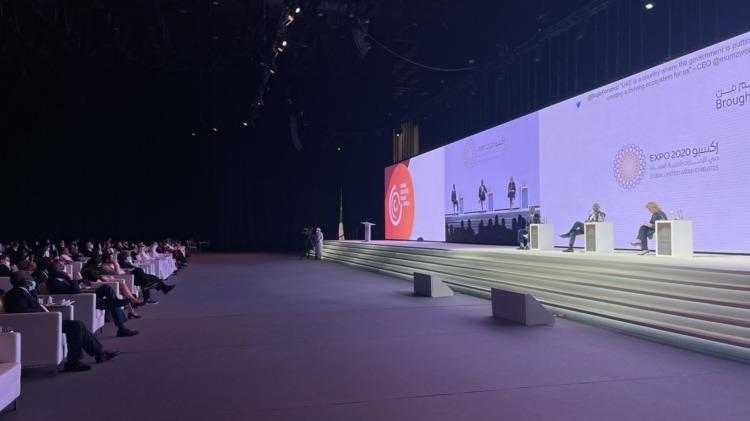- Africa’s emerging “contactless economy” is creating plenty of new growth opportunities that investors can capitalise on
- Global Business Forum Africa 2021 in Dubai examines the growing role of technology as a development tool for African economies
- Important factors to focus on to promote digital technologies include affordable connectivity, affordable devices and digital skills
Africa’s emerging “contactless economy” is growing rapidly in the Covid-era and creating plenty of new growth opportunities that African and foreign companies and investors can capitalise on, industry experts said on Wednesday at the Global Business Forum (GBF) Africa 2021 in Dubai.
Held under the theme ‘Transformation Through Trade’ the two-day Forum is being held at the Dubai Exhibition Centre on the sidelines of Expo 2020 Dubai, under the patronage of His Highness Sheikh Mohammed bin Rashid Al Maktoum, Vice President and Prime Minister of the UAE and Ruler of Dubai.
A session titled Tech-celeration: The Contactless Economy brought together Lacina Koné, Director General of the Smart Africa Secretariat from Côte d’Ivoire; and Innocent Muhizi, CEO of the Rwanda Information Society Authority.
Read: What lies in Africa investment space and economic partnerships?
“When we talk about technology in the developed world, we talk about it disruption, about new players threatening the field,” Moderator Goolam Ballim noted.
“This is in contrast to what we see in Africa, where technology is seen as more developmental than disruptive. It allows new players to enter into the market – a market that is often uncharted.”
Lacina Koné spoke about Smart Africa’s vision to transform Africa into a single digital market by 2030. “The strategy consists of five main points: putting ICT at the heart of national development plans; improving access to ICT especially for banks; ensuring transparency, accountability, and openness through ICT; putting the private sector first in the ecosystem; and using ICT to promote sustainable development,” he said.
“Looking at the registered mobile money market share, Africa owns 50 per cent, we also own 70 per cent of mobile money transactions globally. Africa by nature is a mobile continent and we are leading the world in that sector,” Koné added.
“Intertrade in Africa is only around 18 per cent. The African Continental Free Trade Area aims to promote more integration and Smart Africa is working to facilitate that with smart identity and e-payment solutions.”
For his part, Innocent Muhizi underlined the importance of digital solutions noting that: “If another pandemic hits, we have no resort but digital. You have to automate certain services. For example, during the pandemic alone, mobile transactions grew by 400 per cent.”
Muhizi went on to list three important factors to focus on to promote digital technologies: Affordable connectivity, affordable devices, and digital skills. “You have to offer incentives to digital service providers. These include bringing down the cost of transactions, creating an enabling environment for service providers, and upgrading some of the services.”
GBF Africa 2021 is being hosted at Dubai Exhibition Centre and the forum is bringing government and business leaders together to explore bilateral trade opportunities between the UAE and Africa.
The GBF Africa is the first in a series of Global Business Forums taking place at Expo 2020 Dubai, with the upcoming Global Business Forums focusing on Latin America and the ASEAN region.
Read: Egyptian automotive aftermarket sees massive growth
The sentiments come as the Postal Corporation of Kenya (PCK) has secured US$650,000 (KSh72 million) from TradeMark East Africa (TMEA) in a year-long agreement that is aimed at improving the Corporation’s digital services, to enable it effectively support e-commerce in the East African region.
Dan Kagwe, the Postmaster General and CEO of PCK said the partnership was “a historical moment for this institution, as TMEA becomes one of the partners that have shown confidence in PCK’s capacity to enhance e-commerce in the region.
“It is a great beginning that will open doors for Posta to work with diverse stakeholders and access the potential that exists in the East African region,” said Kagwe. Notably, the country and region at large have over time experienced a rapid shift from traditional mail, money order and stamp sales to the growth of e-commerce and packages below 10kgs that are relatable to SMEs.
Anataria Uwamariya, the Director of Business Competitiveness at TMEA said Posta is an ideal partner to enhance the logistical nature of their interventions to enhance e-commerce ecosystems across the region, especially through its last-mile delivery capabilities. “It is our intention that this partnership will enhance the co-creation and engagement of diverse private and public sector stakeholders in the region,” said Uwamariya.
The lucrative deal funded under the improved business competitiveness strategic objective of TMEA’s Export Capability programme seeks to facilitate increased trade capacity of targeted businesses through increased use of technology to boost regional trade and linking businesses to international markets.
Against the backdrop of the Covid-19 pandemic, PCK is keen to tap into the growth of small parcels and e-commerce items within the postal systems of Kenya from an average of 1800 items every four days in 2018 to 2300 per day in 2021.
As part of the partnership, the corporation intends to increase its capacity to process 10,000 packages daily to provide an efficient logistics and distribution platform for e-commerce entrepreneurs and customers.
Even as Africa’s e-commerce sector becomes more vibrant, and the need for traders to participate in remote trading and use technology for business has grown exponentially, making Posta keen to leverage this dynamic space through its partnership with TMEA.
TMEA plans to implement the Supporting E-commerce Ecosystem Development (SEED) programme that will support interventions focused on boosting cross border e-commerce through improved efficiency within the ecosystem, which Posta has been privileged to benefit from.
Read: Green energy firm Revadia partners with Exotic EPZ to boost agribusiness in Kenya
